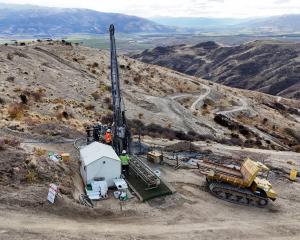
Commercial flights travel between New Zealand and China on a daily basis — all capable of transporting a group of politicians and the inevitable group of essential hangers-on. Airlines are equipped and familiar with having to transport large groups — every rugby team seems to have about the same numbers as this particular delegation and don’t seem to have difficulty in making last-minute bookings for large groups. And if this is impossible for some obscure reason then hiring or leasing is a commercially viable option.
The underlying issue is that politicians like to be seen travelling on exclusive aircraft. Donald Trump is a shining example of that.
Our air force needs to be funded for and supplied with aircraft to fulfil our military obligations as well as supporting civil defence emergencies. Transporting politicians has to be a very low priority when there are cheaper, more convenient and reliable options already in existence.
Russell Garbutt
Clyde
The wider problem
The Learning Centre decision is a symptom of a wider problem
I think nearly all of us would expect that we should educate most of our health workforce in New Zealand. Instead, we find ourselves totally reliant upon health workers educated overseas, often in less fortunate countries, to keep our healthcare system running. Why is this?
The answer is in front of us. We are not prepared to put in the additional effort and finance required. Hence no Learning Centre in plans for the new Dunedin hospital. It is a “nice to have” but not a priority.
This is not really a surprising outcome as education of our health workforce has never been a national priority.
A simple indicator of this is that medical teachers are paid less than their hospital counterparts. Much of the additional work in health education is expected to be done by volunteers through goodwill. Teaching hospitals in New Zealand are not paid in recognition of the additional time and effort in delivering healthcare and teaching at the same time.
As a nation we have consistently lacked the will to make education of our health workforce a priority. We always look to the current financial situation to guide our decisions rather than having a vision of what is needed and then the intent to find the means to achieve that vision. We cannot blame anyone else for the shortage of workers in our healthcare system.
The decision regarding the learning centre in plans for the new hospital is but one symptom of a wider problem. A cure would require recognition education of our clinical workforce should be an integral part of our healthcare system rather than a “nice to have”.
John Highton
Emeritus Professor, Dunedin
China and sovereignty
NICHOLAS Khoo (ODT 26.6.23) is spot on that New Zealand must develop a foreign policy to match 21st century challenges. The definition of Chinese people now includes Uighurs and Tibetans according to the One China policy that we agreed to. Sovereignty only exists for some.
If you asked any "Chinese" person in the world about Xi Jinping what is the safe answer if you don't want backlash to family at home or oneself.
Claire Coveney
Christchurch
[Abridged]
DSO Mahler performance to live in the memory
Your Dunedin Symphony Orchestra reviewer (24.6.23) could have spent a little more time on the post-interval part of the concert rather than largely dismissing the translation of the German text. As far as one can tell this translation seems to be one in common use and does need to be accepted in its twice translated form as an abstract impression rather than a literal representation. The orchestration of the work has always made it a struggle for the soloists to be heard (especially in the opening movement). Importantly, there was plenty to listen to and the hard work that soloists and orchestra put into the inaugural live hearing of Das Lied von der Erde did deserve a more considered review.
Stephen Chalcroft
Belleknowes
Marian Poole replies. I draw Stephen Chalcroft's attention to the use of the words "enlightening" and "prowess" with regards to the DSO. My overriding disappointment belongs to the conductor.
The DSO celebrated with Das Lied von der Erde. Monday was like a family reunion of sorts, the group of string players, wind and brass players plus percussionists greeting each other — longtime friends and colleagues with some new faces to be introduced and welcomed. We immersed ourselves for the week in the intense, emotional world of sound Mahler created, giving voice to the angst and suffering of a "normal" week in the real world. As the echoes of the Town Hall performance drifted away, there was a very long silence before the audience responded enthusiastically. The hour of Mahler produced a magical catharsis and brought peace. What a gift to experience it together on the stage and in the hall.
John Van Buskirk
Wakari
BIBLE READING: The Lord replied "My presence will go with you and I will give you rest." — Exodus 33.14.












